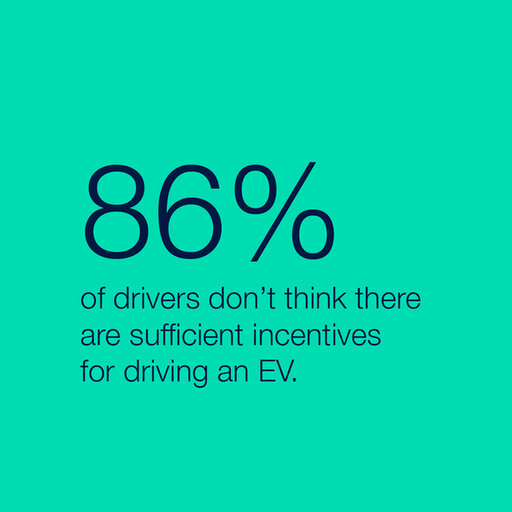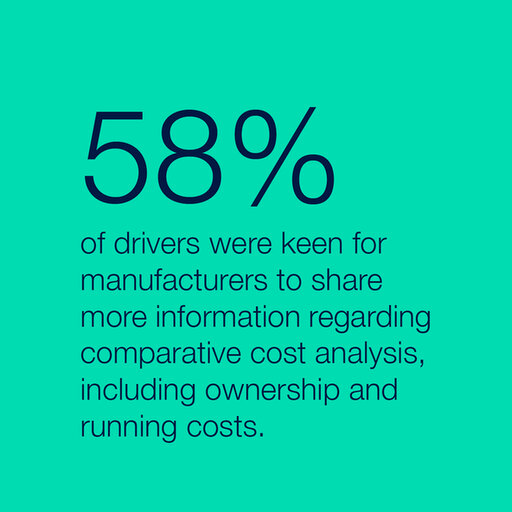
Philip Nothard
INSIGHT DIRECTOR

6 min read
Government-backed incentives and new technology brought a wave of electric vehicles (EVs) to the market between 2010-2020; however, recent years have seen the market begin to stall. A new study of 2,700 UK motorists revealed that 79% didn’t drive an EV and only 17% were considering one for their next purchase. Consumers have more choice than ever with new brands, improved technology, and better range, so what’s stopping them?

Our research brings to life the central challenges that the UK faces in the next leg of its journey towards zero-emission transport. With the UK government’s Zero Emission Vehicle (ZEV) mandate undergoing a period of revision, it is vital that the consumer’s voice be heard as regulations are set and targets enforced.
Cost is crucial
It is not news that the cost of EVs is proving a blocker for many motorists. 69% of drivers said they wouldn’t be willing to pay more for an EV than a petrol or diesel alternative, yet, on average, EV vehicles cost 12% more1.
Greater incentives could fan the smouldering cinders of EV adoption, as 86% of drivers don’t think there are sufficient incentives for driving an EV. When asked what incentives they would like to see, drivers’ top three were central to driving down the cost of owning an EV:
Financial subsidies or grants to reduce the cost of the vehicle (62%)
Reduced cost of charging away from home (56%)
Free/discounted home chargers (52%)

We have seen the impact incentives can have. The Plug-In Car Grant helped to drive the adoption of EVs among private consumers, with 83,052 eligible cars registered between 2011 and 20162. Further, the success of brands bringing lower-priced models to the market, such as BYD (+658% market share YoY), demonstrates the appetite for electric at a reasonable price.

Commitment issues
Upfront cost is only the first hurdle. Once cleared, the industry faces a lack of confidence among drivers about the long-term impact of owning an EV. 58% of drivers were keen for manufacturers to share more information regarding comparative cost analysis, including ownership and running costs.
This was above and beyond other suggested resources, including detailed guides on available models (26%) and information on environmental impact (16%). 46% also said that longer warranties or service packages from manufacturers or dealerships would help address their concerns.
Managing an EV’s battery also proves to be a cause for concern. 68% of drivers felt manufacturers and car dealerships should improve their information on battery health, lifespan, and recycling to meet their needs.
Addressing this confidence crisis is crucial. Moving to electric feels like a leap of faith for many drivers, and the data clearly illustrates that more needs to be done to help more drivers make the change. We know that once behind the wheel, many EV drivers are happy with the change. Of those surveyed who already drove an EV, 87% said that driving an EV had met or exceeded their expectations.
Infrastructure blockers
Confidence levels will always struggle if infrastructure continues to lag. The UK’s charging infrastructure has a major image problem, as 82% of drivers think it is poor. EV drivers also reported issues finding charging points (28%) and 1 in 4 found charging costs to be too high. So where’s the biggest issue? 45% of drivers felt remote areas faced the biggest infrastructure challenges.
Creating deadlines may convey a sense of urgency to the general public about the need for electrification, however that alone is not enough to drive adoption. The government needs to address this growing consumer confidence crisis with tangible incentives to help bring the price of EVs down and improve the nation’s charging infrastructure, while manufacturers and dealerships need to help address concerns about making the move to electric. Without these measures, we will simply set deadlines that we can’t hope to achieve.
“Our research confirms the vast majority of EV owners are happy with their experience, despite well-known challenges with the UK’s charging infrastructure.
“To accelerate adoption, we must address major barriers like accessibility for those without off-street parking and the high costs of installation. The Government’s recent £65m investment in Connected Kerb is a positive step, and reports that EV loans may be subsidised would be another welcome boost if confirmed but the pressure to keep progressing must remain constant.
“The industry also has a role to play in this. A key obstacle we can directly influence is the lack of clear, relevant information at the point of sale. Battery health, lifespan, and recycling are critical considerations for buyers, yet this information is rarely presented in a way that builds confidence.
“Our team of Auto Experts has thousands of car buying conversations each month helping to educate consumers, and they’ve proven the effectiveness of discussing the cost savings EVs can deliver through fuel cost comparisons yet this tactic is often overlooked by manufacturers and dealers.
“For mass EV adoption, we need the Government to deliver and our industry to do all it can to both hold central decision-makers accountable, but also go the extra mile in providing the practical guidance motorists are looking for.”
- Chris Green, Regit CEO and founder

